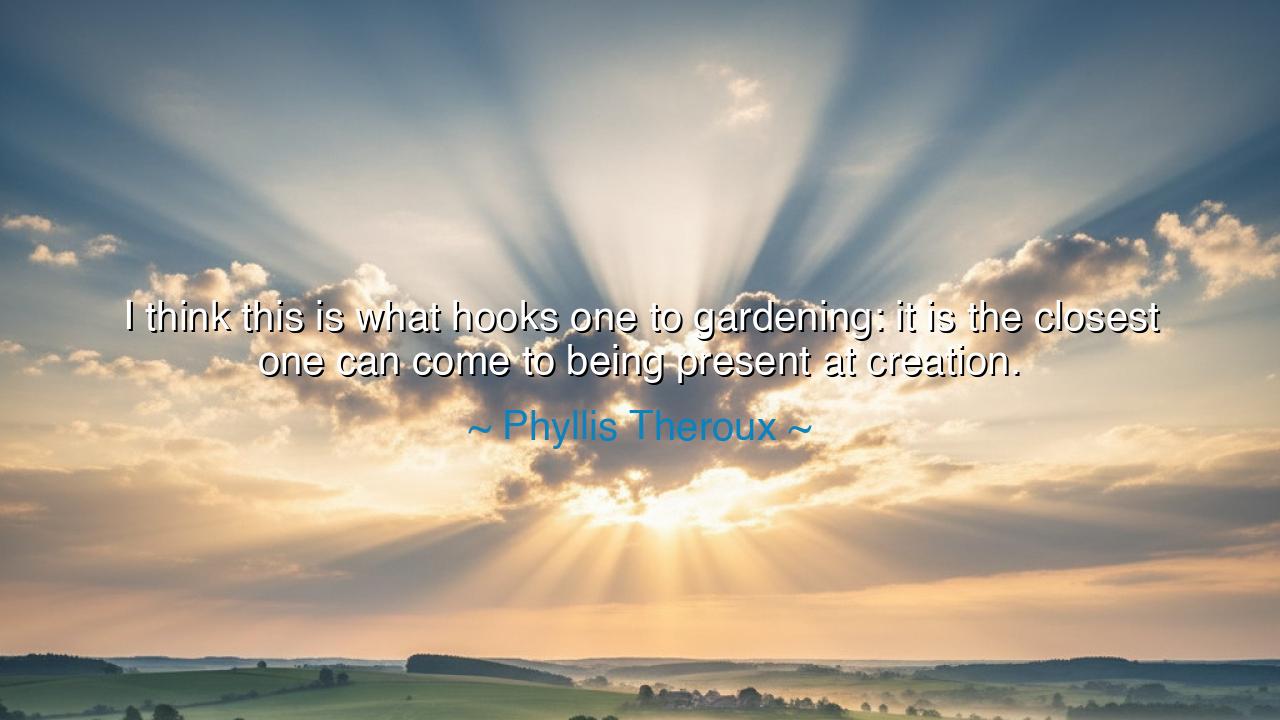
I think this is what hooks one to gardening: it is the closest
I think this is what hooks one to gardening: it is the closest one can come to being present at creation.






Listen well, seekers of peace and beauty, to the words of Phyllis Theroux, who once said: “I think this is what hooks one to gardening: it is the closest one can come to being present at creation.” In these few, luminous words lies the echo of eternity — the ancient truth that when the hands of humankind touch the soil with reverence, they touch the very mystery of life’s beginning. For in every act of planting, tending, and nurturing, we are not merely cultivating the earth — we are entering into silent partnership with the divine act of creation itself.
Phyllis Theroux, a writer of reflection and spirit, lived her life in pursuit of meaning found not in noise, but in stillness — in the quiet rhythms of home, love, and growth. Her words about gardening are more than admiration for flowers and vegetables; they are an expression of awe for the sacred process of bringing something from nothing. She reminds us that to plant a seed and watch it emerge from darkness into light is to witness, in miniature, the birth of the world — to stand, as it were, beside the Creator, seeing the first green shoot pierce the silence of the void.
To the ancients, this idea was not foreign but divine. In the sacred texts of many peoples, the garden was always the place of beginnings. The Persians envisioned paradise as a walled garden filled with flowing water and eternal blooms. The Hebrews spoke of Eden — the first home of humankind — as a garden planted by God Himself, where every living thing began its song. Even the Greeks told of Demeter and Persephone, whose story of loss and renewal mirrored the cycles of seed and harvest. Theroux, though modern, speaks in this same timeless voice: she sees in the act of gardening the continuation of creation, the proof that the divine is not past or distant, but ongoing and ever-present in the soil beneath our feet.
Think of George Washington Carver, who devoted his life to studying the humble peanut and the mysteries of the soil. He said, “I love to think of nature as an unlimited broadcasting station through which God speaks to us every hour.” Carver did not see farming as labor alone; he saw it as revelation — a conversation between man and the Creator. Through his hands, poor land was restored, and lifeless crops found new vitality. Like Theroux, he understood that gardening is not only an earthly act, but a spiritual calling: to heal, to co-create, to give life where there was none.
When one stands in a garden, turning the earth and sowing seed, time itself seems to slow. The air becomes sacred. You sense that what you hold in your hand — a seed smaller than a fingernail — carries within it the secret code of life, the promise of renewal. To garden is to believe in miracles that unfold slowly, silently, yet unfailingly. It is the act of faith without words: the surrender of control, the trust that life knows how to grow. And in that surrender, we glimpse the majesty of creation, not as something long past, but as something that still happens before our eyes.
In a world of machines and noise, we have drifted far from this awareness. We forget that the same power that set the stars in motion still pulses through a seed and a heartbeat. But the gardener remembers. The gardener kneels in humility, not as a master, but as a participant in something greater — a co-worker with the forces of life. This is why, as Theroux says, the work “hooks” the soul. Once you have felt the thrill of life emerging from your care, once you have seen green burst from the brown, you can never again look upon the earth with indifference. You have stood at the altar of creation and seen its fire burn anew.
Thus, the lesson of this quote is one of reverence and participation. To live well is to live as a gardener — not only of soil, but of heart. Sow kindness as you would seeds. Tend your relationships with patience and faith. Weed out bitterness before it spreads. And above all, marvel at the miracle that life continues — through your hands, your choices, your love. For to garden is to say, “I believe in creation still. I believe that the world can be made new.”
So, dear listener, go out to the soil, however small your patch of earth may be. Plant something — a flower, a tree, or a hope. Watch it rise, and as it does, know this truth: you have stood in the presence of the divine. For every gardener, like Phyllis Theroux, becomes in that moment a witness to the sacred — the keeper of a quiet miracle — one who has seen, with their own eyes, the living hand of creation.






AAdministratorAdministrator
Welcome, honored guests. Please leave a comment, we will respond soon